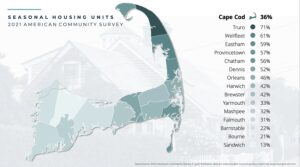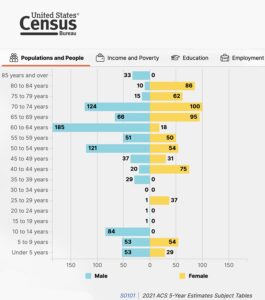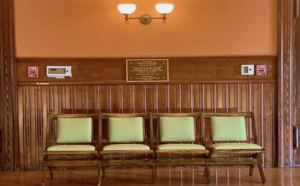PROVINCETOWN — Almost a year ago, town meeting voters endorsed two measures to regulate the ownership of short-term rental properties here and prevent consolidation of the industry in the hands of corporations and large investors.
“To ensure future properties are not used only as short-term rentals, for investment purposes only, we are proposing these consensus measures,” said Town Manager Alex Morse at that October 2023 meeting: “a ban on corporations obtaining short-term rental certificates, Article 11, and a limit on the number of short-term rental certificates an individual can have to two, Article 12.”
The two measures, which passed overwhelmingly, took effect in April when the state attorney general’s office certified they did not conflict with any state laws.
A clause in the new bylaw protects owners of multiple properties that were in place when the bylaw was certified, however, so people or corporations that held more than two as of April 22 are allowed to maintain them until they transfer or sell their properties.
To determine how many people owned more than two short-term rentals at that time, the Independent obtained copies of the state Dept. of Revenue’s short-term rental taxpayer list for Provincetown and the town’s list of rental certificates.
The two lists show that, when the bylaw took effect, about 10 percent of Provincetown’s short-term rentals belonged to owners who held three or more rental certificates or who had state taxpayer accounts for three or more short-term rental units in town.
A large majority of Provincetown’s short-term rentals were in the hands of owners with only one such property, the lists show.
Stopping a Trend
A cluster of transactions in early 2023 shows the type of “investment activity” the town’s new bylaw aimed to prevent.
Puck’s Folly LLC, registered to Jason Harris and Gregory Lombardi of Billerica, sold a parking lot in Cambridge for $9.4 million that January.
In February, the LLC bought a $2.9-million house on Martha’s Vineyard, and in March, it purchased a five-bedroom house at 157 Commercial St. that had once been the Martin House restaurant for $2.8 million.
In April, the LLC bought a single-family house at 101 Bayberry Ave. for $1.9 million and a condo at 6 Mechanic St. for $665,000.
The four purchases totaled $8.2 million in three months — almost the amount the company had made on the parking lot. All four properties were listed as short-term rentals on various platforms, and the three Provincetown properties have taxpayer accounts with the state and short-term rental certificates with the town.
Under the new general bylaw, Puck’s Folly could not repeat this move. Neither it nor its named owners can operate any more short-term rentals here unless they sell those they currently own.
Converting units
The person with the largest number of short-term rental certificates registered to her name is Lyn Plummer, an officer of Dol-Fin Development LLC and several other LLCs.
Plummer holds seven short-term rental certificates for properties owned by her companies, including four at 28-32 Standish St., a former year-round rental property that she converted to condominiums in December.
Under the state’s Condo Conversion Act of 1983, if Plummer had had an “intent to convert” those residential units to condos while tenants lived there, she would have had to help find them comparable housing in Provincetown and help with their moving expenses.
If she could not find them comparable housing, Plummer would have owed her low-income or elderly tenants — defined as people over 62 — four years of continued tenancy in the units they had lived in while she worked to find them a new place to live.
That law has loopholes, however, as the Independent has previously reported. It is legal for a landlord to end tenancy for many other reasons, and to trigger the law’s protections, tenants must prove the landlord’s “intent to convert” in housing court.
Plummer’s business partner, Maria Cirino, told the Independent in August 2022 that she was familiar with the condo conversion law, that she and Plummer had not yet decided what to do with the property, and that “we are always on the right side of the law.”
Plummer applied for five short-term rental certificates in January 2023, and the property was converted into six condominium units the following December.
A similar story played out when developer Tom Tannariello bought 24 and 24A Conwell St. in February 2023 and immediately applied for five short-term rental certificates for the five residential units there.
He sold the three units at 24 Conwell St. in February 2024. New owners Timothy Sabol and Judd Flesch were able to apply for three short-term rental certificates that month because the town’s new bylaws, passed in October 2023, had not yet been approved by the state.
Not That Common
These examples notwithstanding, a review of the short-term rental lists show that there are actually not that many people operating multiple short-term rentals here.
About 20 people had three short-term rentals on either the town’s list or the state’s. Most of those consisted of three residential units on the same property, such as the three units at 129 Commercial St. registered to Donna Pickard of Wellfleet.
Six people had four or five short-term rentals registered to their names, and three people had six, for a total of about 100 units.
Thomas Leonard of Collingwood, N.J. owns 10 of the 27 units at Angel’s Landing, a commercial and residential property across from the Provincetown library. He has short-term rental certificates for six of those 10.
Giovanni Cicero of Eastham owns the building that contains Cabot’s Candy, which includes three residential units, and the one next to it, which contains the jewelry store Zinnia and three more residential units. He has short-term rental certificates from the town for all six units.
Above and behind the Coconuts sunglasses store at 294 Commercial St. are six residential units, all with short-term rental certificates registered to Thomas Gutzler of Boca Raton, Fla.
Some of these units had been long-term rentals until relatively recently — but most of them have not actually been bought or sold in 30 years or more.
Assistant Town Manager Dan Riviello said that the goal of Articles 11 and 12 had been “to make it so the situation did not get worse based on large investors buying up property and converting them to short-term rentals.”
There are just over 900 short-term rental certificates in town, Riviello said, and the market-research website AirDNA.co indicates there are about 1,000 short-term rentals in total here. Putting boundaries around multiple ownership is significant, Riviello said, but that’s also a relatively small share of Provincetown’s market.
“I think the bylaws are doing what they set out to do,” Riviello said. “They can’t really do more than that.”





